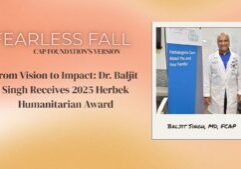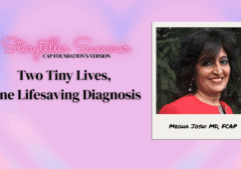Dr. Barbarajean Magnani Talks Novels, CAP Foundation

Barbarajean Magnani, MD, PhD, FCAP, has found success in both the medical laboratory and on the written page, connecting with patients and readers through her dual career as a pathologist and novelist. (Her authorial pursuits were previously spotlighted in a 2019 CAP Foundation Our Story.)
The main character of her novels, Dr. Lily Robinson, is a pathologist by day who moonlights as an assassin and spy, using her medical knowhow to take down dangerous criminals. Dr. Magnani spends her time outside of the laboratory writing her novels—the third in the series will be released in April 2022—and has also worked closely with the Foundation to lead See, Test & Treat programs and support other initiatives. A portion from the sale of each of her books goes toward the CAP Foundation and See, Test & Treat.
Dr. Magnani recently spoke with the Foundation about her writing and work with See, Test & Treat.
CAP Foundation: I read that the idea for the protagonist of your novels initially came from an educational column. Do you still write with an intent to educate?
Dr. Magnani: In 2009 I was approached by the editor-in-chief of the journal Clinical Chemistry to write under a nom de plume for the section in the journal called the “Clinical Chemist.” He wanted a regular feature on toxicology that would have both entertainment and educational value. So, I created Dr. Lily Robinson, an academic pathologist who uses her knowledge of poisons to eliminate global terrorist threats.
The reader was challenged to guess the poison based on the clues in the narrative, and in the next issue of the journal the toxin was revealed, and the reader was treated to a tutorial on the subject.
I love teaching, and I continue to teach pathology and laboratory medicine through my novels. And, much to the chagrin of the other characters in the books, Dr. Robinson has a habit of “lecturing” her non-science colleagues about toxins when she’s involved in a case.
CAP Foundation: While we can likely assume that most pathologists don’t double as assassins, how do your books highlight and represent pathologists and what they do?
Dr. Magnani: I think Lily has always been a conflicted character. As a physician, she follows the Hippocratic oath, but out of a sense of duty to help fight world threats, and suffering from guilt regarding her daughter’s presumed death, she’s allowed the government to exploit her talents. Dr. Robinson rationalizes her dual identity by saying, “The good of the many outweighs the good of the one.” So, to some extent, she sacrifices herself for her country.
Many patients don’t know what pathologists do or how they contribute to their health care. Lily Robinson—assassin aside—like me, sees patients with poisonings or drug overdoses. She is a visible pathologist, and the novels showcase the multiple functions pathologists have, from providing autopsies, diagnosing a biopsy, to analyzing laboratory data.
CAP Foundation: How’d you hear about the CAP Foundation, and what made you want to get involved?
Dr. Magnani: I was a huge fan of Dr. Gene Herbek, who created the program in 2001. I attended a seminar where he talked about See, Test & Treat at Native American reservations Standing Rock and Rosebud and how he was able to connect with patients directly regarding their lab results. I was so excited about the idea that I pitched it to my hospital administration at Tufts Medical Center, which is located in Chinatown [Boston], and I couldn’t think of a better place to have a See, Test & Treat event.
CAP Foundation: What’s the first thing you’d tell someone who’s never heard of the CAP Foundation or See, Test & Treat?
Dr. Magnani: See, Test & Treat is an absolutely feel-good community program where pathologists, gynecologists, radiologists, primary care doctors, nurses, and lab technologists generously donate their time and expertise for a good cause. And being able to provide medical help for someone worried about obtaining health care is a beautiful thing—the relief on their face is telling.
I believe that everyone should have access to quality health care. Unfortunately, many women face cultural or economic barriers to obtaining preventative medical care. They may lack insurance, not have the ability to take a day off from work, or lack adequate understanding of how simple cancer screening procedures like a Pap test or breast exam/mammography can save lives. The CAP Foundation provides a model of care to help overcome these difficulties, and I’m proud to support that initiative. This is why a portion of the proceeds from my novels are donated to the CAP Foundation.
Learn more about Dr. Magnani and her books and consider making a donation in support of the CAP Foundation and its programs, including See, Test & Treat.
More Stories
Why Donate
Every person deserves a diagnosis. Support care beyond the microscope. Expand access to pathology-locally and globally.










